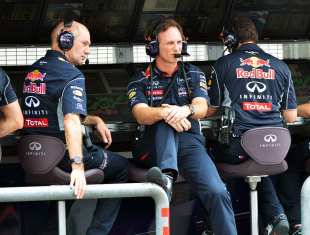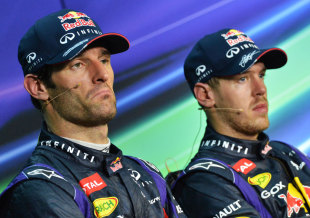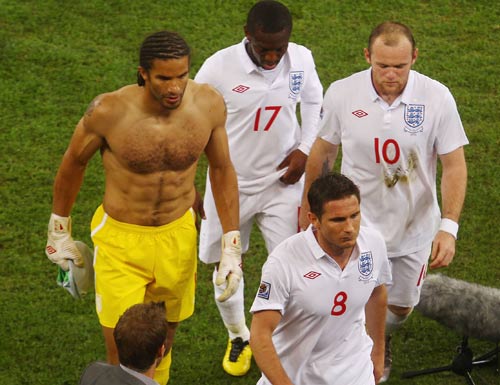
When asked whether Sebastian Vettel would receive a punishment for what was clearly a ruthless act of defiance at the Malaysian Grand Prix, Christian Horner simply said he would be talking with his driver behind closed doors. But in reality what can Horner do?
Formula One isn't like other sports. Vettel can't be left on the bench for the next couple of races without seriously damaging Red Bull's chances in the drivers' and constructors' championships and therefore its future income. So intertwined are driver and car, and so competitive is the F1 field, that bringing in a substitute would result in a serious amount of lost points. Docking wages is another option used in other sports, but with a driver like Vettel, who is on a huge retainer anyway, the extra eight points gained in Malaysia may well seem worth the price if it secures him the title at the end of the season.
What Vettel's actions highlighted, therefore, is how reliant the likes of Red Bull are on their drivers being team players, especially at the front of the field. Formula One is a team game, but ultimately the driver has the ability to decide whether he wants to play along. He can hold the team to ransom through the steering wheel in his hands and the pedals at his feet, and there is little the team can do about it.
Of course, the balance of power between team and driver shifts the closer you get to the front of the grid. Take Paul di Resta's Australian Grand Prix as an example. He was closing on Adrian Sutil for seventh at the end of the race, and clearly had the pace to pass, but instead obeyed his team's order to hold position. Force India was in with a chance of 10 points - 10% of its overall haul from 2012 - and di Resta reluctantly put team before his own personal battle with Sutil.
"I think it was quite obvious [I could have passed], wasn't it? When you're catching someone at three seconds a lap ..." he said in Malaysia before trailing off and remembering how dependent he is on the team for his shot at being an F1 driver. "Essentially we were in a strong position so I had to accept it. It was a little bit daunting because we had a car that potentially should have finished seventh."
Further up the grid the stakes are higher as world championships become the target and the interests of the team are more likely to be clouded by the desire for victory. The pit wall has a few weapons in its armoury via the pit-to-car radio, but between gentle persuasion and the nuclear option of threatening the driver's future there isn't a huge amount a team principal can do.
"If they [the driver] feel they're making a decision when you've given them the facts and made a request, then you can do it that way," Martin Whitmarsh said on Sunday evening. "What you can't do is manage these guys by threat of discipline, breach of contract and all those things, unless the situation is exacerbated and you've got a better driver lined up!"
Understandably, that is not something Horner is willing to do with Vettel. On Sunday evening the Red Bull boss said Vettel had pushed the limit of the team's good will, but that he had not quite broken it.
"He obviously chose to hear what he wanted to hear," Horner said. "He's a racing driver and he hasn't achieved the championships he has by not pushing the limits. He has pushed that today with his team-mate and with the team, but they've been a pairing for five years, they've won three consecutive constructors' championships together and that was our 35th victory today between the two of them. They are one of the most successful pairings of all time.
"Sure, they have never been the best of mates and they are never going to spend Christmas together, but there is a respect between the two of them and I'm sure with a bit of time to reflect we will quickly move on from this."
Horner knows that, even with Vettel's ruthless streak, he still has one of the strongest driver line-ups on the grid and that ultimately that will yield results. The other option is to have a clear hierarchy set out between the two drivers like Stefano Domenicali has with Fernando Alonso and Felipe Massa at Ferrari.
Which approach is best is hard to say. Vettel and Webber are arguably a stronger combined pairing than Alonso and Massa, but if the ructions at Red Bull lead to schisms within the team then the relationship could implode.
"I never talk about the other teams, you know me, but if it's something from a general point of view, well it's part of the competition," Domenicali said after the race in Malaysia. "It's part of the fact that every driver thinks that he's the strongest - and it's good for them to be like that - and it's part of the maturity of the drivers that I employ at Ferrari to understand that."

Webber has already said that he expects Vettel to receive "protection as usual" from Red Bull, which leaves Horner with a huge job on his hands as he attempts to appease one driver and discipline the other. He just about managed it in 2010 after his drivers collided at the Turkish Grand Prix, but back then it was not so clear who was in the wrong. This time he has to be seen to act rather than just smooth over the cracks.
What's more it's likely we'll see a similar on-track situation in the future. The way the Pirelli tyres are dictating strategy means that it will not be unusual to see team-mates line astern in the final stint but being told to save tyres. If the situation occurs again but reversed will Vettel let Webber past? And if he doesn't, what lengths will Webber go to take the position? Horner might be hoping to "quickly move on", but things are only just getting started.
Laurence Edmondson is deputy editor of ESPNF1
© ESPN Sports Media Ltd.
 Laurence Edmondson is deputy editor of ESPNF1 Laurence Edmondson grew up on a Sunday afternoon diet of Ayrton Senna and Nigel Mansell and first stepped in the paddock as a Bridgestone competition finalist in 2005. He worked for ITV-F1 after graduating from university and has been ESPNF1's deputy editor since 2010
Laurence Edmondson is deputy editor of ESPNF1 Laurence Edmondson grew up on a Sunday afternoon diet of Ayrton Senna and Nigel Mansell and first stepped in the paddock as a Bridgestone competition finalist in 2005. He worked for ITV-F1 after graduating from university and has been ESPNF1's deputy editor since 2010

